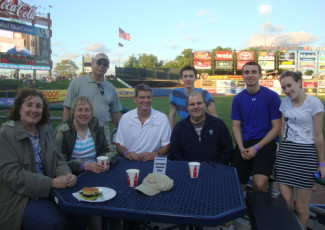Helping Homeless and Hungry Students
By Sonya Stinson
December 23, 2015
A recent study found that there’s a significant level of need among community students. Here’s how one college is doing its part to support its students — and the community.
The new food pantry at Delgado Community College, in New Orleans, has fed nearly 300 people since opening in October, on the main campus at City Park. That number includes an estimated 75 to 80 students and other members of their families, says Gilda Brown Ebanks, Single Stop assistant coordinator and financial planning manager at Delgado. It also includes one family who turned to the food bank for help after losing everything they owned in a fire.
The campus organization Ebanks heads is part of Single Stop USA, a national nonprofit organization that connects college students with resources such as SNAP benefits, Medicaid, tax preparation and child-care assistance. Single Stop USA was one of the partners in a study, released earlier this month, which shows a significant level of hunger and homelessness among community college students. Researchers at the Wisconsin HOPE Lab conducted the study, and Delgado was one of 10 community colleges included in the sample.
Thirteen percent of survey respondents said they had experienced homelessness, and more than half said they had experienced food insecurity while they were students. At Delgado, in a state that has the nation’s third-highest poverty rate, at 20 percent, and in a city where more than 27 percent are poor, Ebanks has seen plenty of students going without. And she says their studies suffer when they struggle with such dire needs.
“Those issues take precedence over everything else,” she says. “When we do a holistic approach and have organizations that help students not only focus on academics but also deal with the social issues, it helps students to remain in school.”
Here’s how community colleges can tackle hunger and homelessness on campus:
Partner with a volunteer or social-service organization. AmeriCorps VISTA volunteer Luis Reyes came up with the idea to start a food pantry soon after he arrived at Delgado, in March. Reyes works with Ebanks as a Single Stop resource coordinator, and together they oversee the collection of donations, the organization of the pantry and the once-a-month distribution of food. They get part-time help from a Delgado student volunteer and an intern from a local university.
Include families. At Delgado and other colleges, Single Stop services — from benefits screening to legal assistance — are offered free of charge to students and their families. Ebanks notes there’s a strong link between family survival and student success, especially among nontraditional students, who may be working full time and raising children while attending school.
Turn to your campus family for help. When plans to supply the food pantry through a partnership with Second Harvest hit a roadblock, Ebanks and her team went to department heads and students to ask for donations. Though they recently started receiving some food from Second Harvest, the project relied solely on campus donations for the first couple of months.
Get help from other local schools to address housing needs. Delgado partners with Southern University at New Orleans and the University of New Orleans to provide dormitory rooms on those campuses to homeless students who are receiving financial aid.
Be sensitive when offering assistance. Sometimes, students are reluctant to ask for help, and many who do ask would prefer that others not know about the need for assistance. That’s why Delgado placed its food pantry away from the Single Stop office.
“We understand that’s a very delicate issue,” Ebanks says, “so we put it in a building where there’s not much traffic, where students can feel comfortable coming into to the pantry and receiving the assistance they need.”






